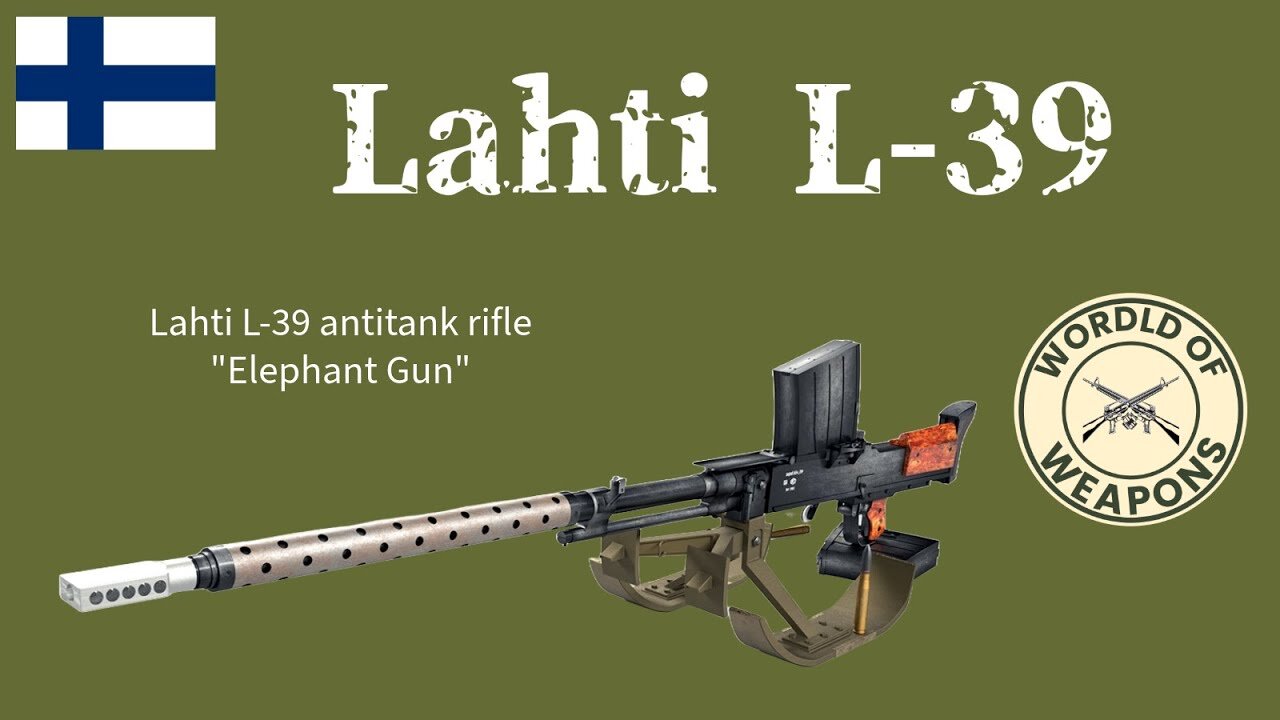Premium Only Content

Lahti L-39 🇫🇮 The Finnish terror of tanks
Lahti L-39 antitank rifle "Elephant Gun"
The L-39 antitank rifle (official Finnish designation 20 pst kiv/39, unofficial "Norsupyssy" – elephant gun) was developed by famous Finnish arms designer Aimo Lahti on request from Finnish army. Early prototypes were built around proprietary 20×113 ammunition, also designed by Lahti, but in mas production this was changed to more common 20x138B ammunition, which was more powerful, has wider selection of loadings (AP, AP-T, AP-HE, Incendiary etc), and was also common with 20mm AA guns, bought from Germany. About 1 800 of these guns were produced by VKT factory during the WW2, and although 20mm shells were rather ineffective against Soviet T-34 and KV tanks, Finnish army made a good use of this weapon to fight light armor, bunkers and other targets of importance. In 1944, an 'anti-aircraft rifle', known as 20 it kiv/39-44, was developed from the L-39, by adding select-fire capability and simple anti-aircraft mount. It must be noted that Finnish army kept its stocks of Lahti L-39 anti-tank rifles well after the WW2 – many were surplussed and sold to USA in early 1960s and last ones were scrapped or sold as surplus in mid-1980s.
Lahti L-39 anti-tank rifle is a semi-automatic, gas operated weapon. Gas piston is located below the barrel, and a manual gas regulator is provided in gas block. The bolt locking is achieved by vertically sliding locking block, which is installed in the bolt. When in battery, this locking block is forced up by cam surface in the bolt carrier to engage the slot cut in the receiver. After discharge, rearward movement of the gas piston and bolt carrier forces the locking block to fall down and unblock the bolt; after that, bolt is free to recoil along with bolt carrier. One unusual feature of the Lahti L-39 anti-tank rifle is that bolt remains open after each shot, which allows the barrel to cool down faster after each shot. Despite that, gun is fires from closed bolt, and the firing sequence after each shot involves two deliberate actions. First, shooter must squeeze grip lever (located below the trigger guard) to release bolt forward. Once bolt is fully locked, shooter can pull the conventional trigger and fire the gun. Feed is from detachable top-mounted magazines, ejection is to the bottom. To reduce the felt recoil, rifle is equipped with massive muzzle brake and a soft shoulder pad. Standard iron sights are fully adjustable and calibrated between 200 and 1400 meters. Lahti L-39 anti-tank rifle was equipped with unusual "dual" bipod, with two sets of legs, one with spiked shoes for use on more or less hard ground and another with skid-type shoes for use on soft ground or snow.
-
 1:44:33
1:44:33
ObaTheGreat
3 hours agoCrypto vs The World w/ Oba The Great And YaBoySkey
9 -
 44:34
44:34
Kimberly Guilfoyle
6 hours agoCountdown to Inauguration Day, Plus California in Crisis, Live with Joel Pollack & Roger Stone | Ep. 189
91.7K39 -
 1:32:41
1:32:41
Redacted News
5 hours agoBiden's 'SNEAKY' plot to slow down Trump REVEALED | Redacted w Clayton Morris
101K147 -
 56:32
56:32
Candace Show Podcast
4 hours agoOH SNAP! Justin Baldoni Is Now Suing Blake Lively and Ryan Reynolds PERSONALLY | Candace Ep 134
76.6K93 -
 DVR
DVR
Havoc
2 hours agoHell on Earth | Stuck Off the Realness Ep. 24
1.77K -
 11:32
11:32
Tundra Tactical
2 hours agoATF Violates Court Order to ATTACK Americans.
6.74K1 -
 DVR
DVR
Common Threads
3 hours agoLIVE DEBATE: Will Mainstream Media Survive a 2nd Trump Term?
5.63K1 -
 LIVE
LIVE
Quite Frankly
6 hours ago"Biden's Farewell, Dreams For Sale, Spy Hunting, and Open Lines" 1/16/25
1,264 watching -
 54:59
54:59
Sarah Westall
2 hours agoCalifornia puts Children 2nd to Big Pharma Profits, Chemically Castrating Boy w/out Dad’s Consent
3.15K -
 DVR
DVR
theDaily302
11 hours agoThe Daily 302- Craig "Sawman" Sawyer
2.07K